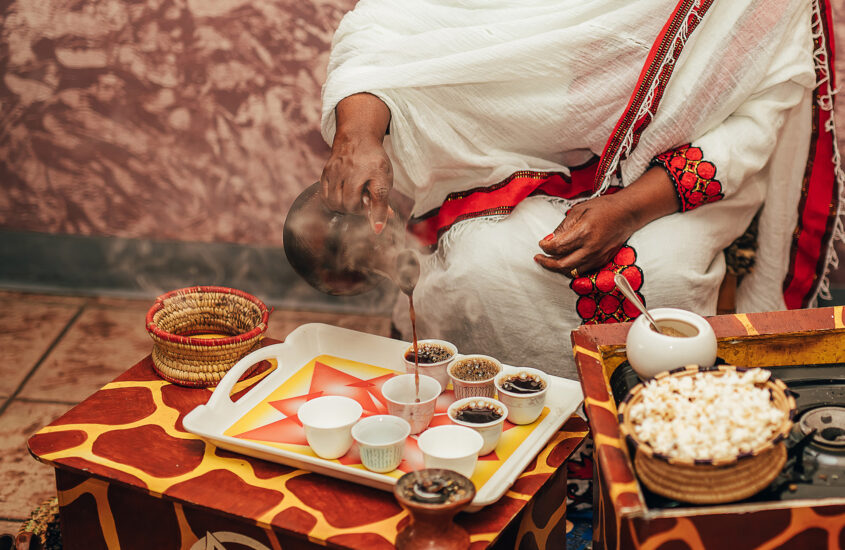Coffee Across Cultures: Exploring Rich Traditions and Global Connections

Coffee is far more than a morning pick-me-up; it’s a global connector, a cultural ambassador, and a tradition steeped in rich history. From the aromatic coffee houses of Istanbul to the bustling cafes of Paris, and the serene kissaten of Japan, coffee serves as a bridge linking diverse cultures and practices. This article explores the fascinating journey of coffee, its cultural significance across different societies, and how sharing a simple cup can deepen our appreciation for the world’s diverse traditions. Through this lens, we uncover the stories behind each sip, celebrating the unique ways in which coffee brings people together.
The Origins of Coffee: A Journey Through Time
The story of coffee begins in the ancient coffee forests of Ethiopia. According to legend, a goat herder named Kaldi discovered the potential of these beans after noticing that his goats became energetic after eating them. From Ethiopia, coffee spread to the Arab world, where it became an integral part of Islamic culture. The drink was so cherished that the first coffee houses, known as qahveh khaneh, emerged in the Middle East, serving as centers for social interaction, intellectual exchange, and political debate.
Coffee’s Global Spread: A Catalyst for Cultural Exchange
The journey of coffee from the Arab world to Europe and beyond is a testament to its universal appeal. By the 17th century, coffee had made its way to Europe, where it quickly gained popularity. Coffee houses began to spring up across major cities like London, Paris, and Vienna, becoming hubs of intellectual and cultural activity. These establishments were frequented by artists, writers, and philosophers, fostering a sense of community and cultural exchange.
Italian Espresso Culture: A Ritual of Precision
Italy’s coffee culture is synonymous with espresso. This strong, concentrated coffee is not just a drink but a ritual. Italians take their espresso seriously, and the preparation process is treated with great respect. In Italian culture, drinking espresso is a social activity, often enjoyed while standing at a bar and engaging in lively conversation. The art of making espresso, with its precise measurements and techniques, reflects the meticulous nature of Italian craftsmanship.
Turkish Coffee: A Tradition Steeped in History
Turkish coffee, known for its strong flavor and unique preparation method, is a symbol of hospitality and tradition. The process of making Turkish coffee involves grinding the beans into a fine powder and brewing them in a special pot called a cezve. The coffee is served in small cups, often accompanied by a piece of Turkish delight. In Turkish culture, coffee is more than just a drink; it plays a central role in social gatherings, ceremonies, and even marriage proposals. The custom of reading fortunes from the coffee grounds left in the cup adds a mystical element to this ancient tradition.
Japanese Coffee Culture: The Art of Precision and Harmony
Japan, known for its tea culture, has also embraced coffee with a unique twist. Japanese coffee culture is characterized by precision and attention to detail. The pour-over method, popular in Japan, involves slowly pouring hot water over coffee grounds in a circular motion, ensuring a balanced and flavorful brew. Japanese coffee shops, or kissaten, offer a tranquil environment where customers can savor their coffee in peace. The meticulous preparation process and serene atmosphere reflect the Japanese principles of harmony and mindfulness.
Ethiopian Coffee Ceremony: A Celebration of Community
In Ethiopia, the birthplace of coffee, the coffee ceremony is a cherished cultural tradition. This elaborate ritual involves roasting raw coffee beans, grinding them by hand, and brewing the coffee in a jebena, a special clay pot. The ceremony is conducted by a woman, often dressed in traditional attire, and is a symbol of hospitality and respect. Guests are invited to participate in the process, which can take several hours. The Ethiopian coffee ceremony is not just about drinking coffee; it’s a communal experience that strengthens social bonds and celebrates cultural heritage.
Café Culture in Paris: A Hub of Intellectual Exchange
Parisian café culture is renowned for its charm and sophistication. Cafés in Paris are more than just places to drink coffee; they are social hubs where people come together to relax, converse, and observe the world. The café terrace is an iconic Parisian setting, offering a front-row seat to the city’s vibrant street life. Historically, Parisian cafés have been frequented by artists, writers, and intellectuals, making them centers of cultural and intellectual exchange. The leisurely pace of café life in Paris encourages reflection and conversation, embodying the French art de vivre.
Colombian Coffee Farms: A Source of National Pride
Colombia is one of the world’s leading coffee producers, and coffee is deeply ingrained in the country’s cultural identity. Colombian coffee is celebrated for its quality and rich flavor, a result of the country’s ideal growing conditions. Visiting a Colombian coffee farm offers a glimpse into the traditional methods of coffee cultivation and processing. The National Federation of Coffee Growers of Colombia, represented by the iconic character Juan Valdez, has played a significant role in promoting Colombian coffee globally. Coffee tours and tastings provide an opportunity to learn about the history and craftsmanship behind Colombian coffee, fostering a deeper appreciation for this national treasure.
Vietnamese Coffee: A Blend of Tradition and Innovation
Vietnamese coffee culture is characterized by its unique preparation methods and bold flavors. One of the most popular ways to enjoy coffee in Vietnam is with condensed milk, creating a rich and sweet beverage known as cà phê sữa đá. The use of a drip filter, called a phin, adds to the distinctiveness of Vietnamese coffee. Street-side cafes, where customers sit on low stools and enjoy their coffee, are a common sight in Vietnam. This casual and communal way of drinking coffee reflects the country’s vibrant street culture and offers a taste of everyday life in Vietnam.
The Role of Coffee in Modern Cultural Exchange
In today’s globalized world, coffee continues to serve as a bridge between cultures. Specialty coffee shops, with their focus on sourcing and showcasing beans from different regions, highlight the diversity and complexity of coffee. These establishments often provide educational experiences, such as cupping sessions and brewing workshops, where customers can learn about the origins and characteristics of various coffees. By exploring and appreciating coffee from different cultures, we can gain a deeper understanding of the traditions and practices that shape our world.
Coffee’s rich cultural history and its role in fostering cultural exchange make it a truly universal beverage. Whether it’s the precise art of making Italian espresso, the communal experience of the Ethiopian coffee ceremony, or the innovative flavors of Vietnamese coffee, each tradition offers a unique perspective on this beloved drink. By sharing and appreciating coffee from different cultures, we not only enrich our own lives but also build bridges of understanding and connection across the globe. The next time you sip your coffee, take a moment to reflect on the journey it has taken and the cultural stories it carries within its brew.
Share your Coffee Connection Journey with us. Whether it’s a new blend of coffee you have discovered, an unforgettable café experience, or a unique brewing method you’ve learned recently, your experiences can inspire and resonate with others. Join our community and let’s continue building bonds, one cup at a time. Share your coffee tradition on social media and tag CoffeEnthusiasts with #CoffeeConnectionJourney.









